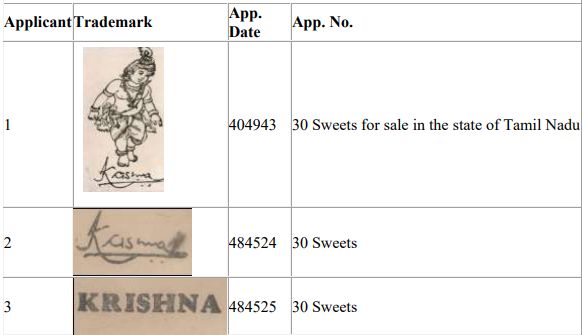- with Inhouse Counsel
- with readers working within the Law Firm industries
Trade marks that are used by a person in relation to a family run business, where the ownership of the said mark lies equally with each member of the family, are colloquially known as family owned trademarks. These trademarks entail parallel rights of use of the mark, by all the family members. Therefore, it protects each heir under the doctrine of shared goodwill and common family legacy.
Disputes pertaining to a family's trade marks arise when the family splits and the question of how the intellectual property of the family run business will be shared comes up. So far as the question of law goes in terms of trade mark disputes between families, the Courts have always been of the view that it may be treated as a family dispute simpliciter.
How the Courts have interpreted Inheritance of Family owned Trademarks in India?
The issue of family trademarks has come before various courts in India over the years. In such cases, the predominant opinion of the Courts has been that all the family members of the trade mark in question, enjoy lawful rights to use the inherited trade mark and therefore, no single heir has an exclusive right to use such inherited trade mark, in the absence of anything to the contrary (eg. a will).
In a recent case decided by the Hon'ble Madras High Court, the issue, inter alia, of granting a stay on using a family trade mark by a family member was discussed. In the said case, titled Sri Krishna Sweets Private Ltd. vs. M. Murali1, two brothers claimed rights over use of the mark SRI KRISHNA SWEETS by virtue of inheritance of the same from their father.
It was the case of the Plaintiff (Sri Krishna Sweet - through its Managing Director) that the father of the Plaintiff and the Defendant (Plaintiff's brother), had founded a restaurant called Sri Krishna Bhavan in 1948 in Coimbatore. Subsequently, the elder son, M. Krishnan (the Plaintiff) had started the business of Sri Krishna Sweets under a partnership with his mother and aunt in 1979, which was when he had obtained registrations for three trade marks under class 30, namely:

This partnership was eventually dissolved and M. Krishnan became the sole proprietor of the business as well as the trade marks. At that time, he also permitted his younger brother, the Defendant - M Murali, the right to use his trade marks (i.e. of the Plaintiff), for the purpose of starting a restaurant.
Thereafter in 2002, M. Krishnan assigned all the trade marks owned by him to his wife, and made the Defendant i.e. his brother, the Director of Sri Krishna Sweets. The Defendant left this position in 2010 and started his own company, all the while still continuing to use the trade marks of Sri Krishna Sweets. When M. Krishnan's wife re-assigned the rights to the Plaintiff's trade marks back to M. Krishnan, he requested that a written license agreement be made in order for his brother to continue using the Plaintiff's marks. It was at this point that the Defendant refused to agree to the same and stated that these trade marks belonged to their father, and hence has been equally inherited by him upon their father's death.
The Trial Court was not convinced enough to grant an interim injunction to the Plaintiff, thereby stopping the Defendant from using the said mark. The learned Trial Judge found that the Plaintiff had not made out a prima facie case, and concluded that there had been acquiescence on the part of the registered holder of the trade mark for over two decades. The learned Trial Judge also found that the balance of convenience was in favour of the Defendant. On the aforesaid findings, the learned Trial Judge refused to grant an injunction.
Therefore the Plaintiff went on appeal. In appeal, while deciding the matter in favour of the Defendant, the Madras High Court made the following observations:
- It was clear from the evidence on record (i.e. the website screenshots, invoice copies and advertisements) that the name "Sri Krishna Sweets" had been established and used since 1948 by the Late Mahadeva Iyer (father of both parties). The Court rejected the Plaintiff's argument that any and all association of the business name with the late Mahadeva Iyer was out of respect. Relying on Narasus's Coffee Company v. Narasu's Roller Flour Mill, it held that in cases of trademark disputes between families, the court will treat it as a family dispute instead of a trademark dispute simpliciter.
- That although the Plaintiff has been referring to use of the mark since 1948, he himself had not been born then. Therefore, the only explanation is that the mark was used by the father and is therefore a family trade mark.
- It was noted by the Court that the Plaintiff had removed the words "Sweet Tradition since 1948" and the reference of Mahadeva Iyer from their company's website only after filing the suit, in an effort to detach Sri Krishna Sweets from Mahadeva Iyer.
- With regards to the claim of the use of the mark and the above tagline by the Defendant under an oral licence, the Court observed that every business dealing of the Plaintiff company, including every assignment or licence over the course of several years, had been documented. Therefore, the Court did not agree to the claim that oral licences were granted by the Plaintiff company to the Defendant for using the trade mark SRI KRISHNA SWEETS.
Many famous cases pertaining to family trade mark disputes have been decided by the Courts over the years, and one way in which these cases are settled is by division of either areas where a particular party shall use the family trade mark or division of the entire business into segments, if possible, and distribute it amongst the parties, thereby allowing them to use the family trade mark all over the country, but only for those specific industries/segments of industry.
For example in the case of Parle Products Pvt. Ltd. vs. Parle Agro Private Limited2, decided by the Bombay High Court, it was the case of the Plaintiff that both the parties originate from the same family business running under the trade mark Parle. The predecessor in interest of the Plaintiff and the Defendant was in the business of manufacturing biscuits and beverages. Initially, in order to divide the labour, the Plaintiff took over the biscuit portion of the business and the Defendant took the business of beverages. Thereafter, they both decided to exit from each other's respective area of work, and started manufacturing independently, albeit sticking to the same industry (F&B) i.e. Plaintiff for biscuits and Defendant for beverages.
Both parties to the suit had the right to use the house mark PARLE along with the product mark for their individual goods. However in 2007, the Defendant diversified into biscuits as well, and this was objected to by the Plaintiff. It was observed by the Court while hearing the matter that, there was no Agreement between the parties, by which either of the groups was restrained from carrying on business of the other group for any period of time or within any place. The Plaintiff had not disputed the Defendant's right of carrying on business in confectioneries or biscuits. The Plaintiff only contended that the Defendant cannot use the trademark "Parle" singly or in conjunction with its product identification marks such as "Buttercup" or "Mintrox" (biscuit names), which will deceive the public about the origin of the product.
Rejecting the reliefs prayed for by the Plaintiff, the Court stated that the Defendant cannot be stopped from using the house mark 'Parle' for confectionary goods, since the same is being used amongst family members. It was observed that "a partner or employee who has left a well-known firm and set up a similar business of his own is entitled to advertise his former connection, but must take care to do it so as not to suggest that the connection is still existing between them and him, or that they have ceased to carry on business and he is their successor. This shows that otherwise than in a case of intended misdirection, an erstwhile partner or employee can even advertise his former connection taking care to show that it is only history and that there is no current agency or branch of the other business firm."
Family trademark dispute is a Family Dispute!
Family disputes have generally been treated with a different approach by the Courts all over, even if there are elements of commercial disputes present therein. A trade mark at the end of the day is also a form of property, therefore it is understandable that members of a family that have a business running under a trade mark having goodwill and value, will not give up their rights in the mark without a fight. In the case of Shri Ram Education Trust vs. SRF Foundation & Ors3 the Plaintiff, who was one of the legal heirs of the famous Sir Shri Ram, was claiming sole ownership of the trade mark SHRI RAM, by representing to the court that the same was first used by him in the year 1988.
Over the course of the hearing, it was brought to the attention of the court that the said mark was first used by their grandfather for running premier educational institutions, such as Lady Shri Ram College, Shri Ram College of Commerce etc. Also, by virtue of their common lineage, both the parties had equal rights to use the family owned trademarks. Treating the matter as a family dispute, the court opined that one member of the family cannot, without something more being shown to the contrary, claim exclusive ownership of the mark. Mere prior adoption by one heir will not exclude the other heirs from using the same mark.
Division of Family owned Trademarks
Division of rights over the family's trade marks by means of a family settlement or Memorandum of Understanding has also been an acceptable method of family trade mark division.
In the case of Rajni Dua & Ors. Vs. Bhushan Kumar & Ors, MANU/DE/0850/1998 it was held by the Delhi High Court that "I am of the considered view that the arrangement which had been going on during the lifetime of late Mr. Gulshan Kumar and which has been again reiterated in the notes prepared in the hand writing of defendant 1 and plaintiff No. 2 and later on given a concrete shape in the form of family arrangement must continue."
Taking reference of the above cited judgment the Delhi High Court in the case of Darshan Lal Dhooper vs. Motia Rani & Ors., MANU/DE/1589/2002 held that "The dissolution deed proved in the present petition is in the nature of a family arrangement between the parties and, Therefore, the intention of the parties in the same should be given due weightage and should be respected in order to maintain peace, amity and harmony in the family. According to the said terms and conditions of the dissolution deed neither the petitioner nor the respondent Nos. 1 to 3 exclusively could claim to be the proprietor of the aforesaid trade mark 'PLAZA' of its own. Therefore, any application for registration of the trade mark 'PLAZA' could have been filed only, in the joint names of the petitioner as well as the respondent Nos. 1 to 3 and not otherwise in terms of the aforesaid agreement."
Thereafter, in the case of Haldiram Bhujiawala & Ors. Vs. Anand Kumar Deepak Kumar & Ors., MANU/DE/3333/2015 under the terms of a dissolution deed, the father of the Plaintiffs had the right to exclusively use the trade mark 'Haldiram Bhujiyawala' for the whole country (except West Bengal), while the mother of the Defendants had the right to use the same trade mark but only in West Bengal, for running identical business of selling namkeen and sweets. Thereafter, through a Will, the common ancestor of the parties further solidified the terms of the dissolution deed. Therefore, when the Defendants opened a shop under the said mark in Delhi, the court held that "the opening of the shop by the progeny of Rameshwar Lal, that is the Defendants, were absolutely wrong on their part."
In the case of Vimi Verma vs. Sanjay Verma & Ors., MANU/DE/3804/2013 the Delhi High Court upheld the terms of a memorandum of understanding entered into between the members of the family, for division of the four family trade marks, between separate family members. The court held that "both parties have to comply the terms of the MoU wherein both parties are allowed to use the trademarks, labels with their names and or style of writing in the following manner:
- Trade marks "Simpex" and "Simpex-pro" or any other similar or sounding similar or imitation of these trademarks will exclusively belong to Group 2 family sub group of Mr. Pankaj Verma, his spouse, children and HUF of Mr. Pankaj Verma.
- Trade marks "Prolite" and "Profit" and brand label "VS" or any other similar or sounding similar or imitation of these trade marks or brand label will exclusively belong to Group 1 family sub group of Mr. Sanjay Verma, his spouse, children and HUF of Mr. Sanjay Verma."
Conclusion
When it comes to trade mark disputes between family members, the Courts have been of the opinion that the peace and tranquillity of family in such cases must be preserved, and family arrangements should not be disturbed as far as possible. The peace and amity in a family can be reinstated if the family arrangement is adhered to and respected.
When it comes to matters pertaining to inheritance of a family owned trademarks or division of a family trade mark, family owned trademarks it is important to see if the person claiming better rights under the mark has actually perfected the same after inheriting it. A lot of times, suits of this kind are amicably settled as well, wherein both the parties can come out with a win.
However, the most effective resolution to such issues cropping up in future would be if it were to be statutorily addressed, so as to avoid discrepant or divergent interpretations.
Footnotes
1. CMA.No.2266 of 2017
2. Notice Of Motion No. 4431 Of 2007 In Suit No. 3203 Of 2007
3. MANU/DE/0181/2016
This article was first published on Bar & Bench- here
For further information please contact at S.S Rana & Co. email: info@ssrana.in or call at (+91- 11 4012 3000). Our website can be accessed at www.ssrana.in
The content of this article is intended to provide a general guide to the subject matter. Specialist advice should be sought about your specific circumstances.


